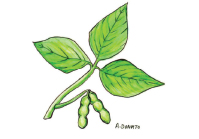The use of dietary supplements by patients with cancer has increased significantly over the past 20 years despite insufficient evidence of safety and effectiveness. Finding reliable sources of information about dietary supplements can be daunting. Patients typically rely on family, friends, and the Internet, often receiving misleading information.
The ASCO Post’s Integrative Oncology series is intended to facilitate the availability of evidence-based information on integrative and complementary therapies commonly used by patients with cancer. We chose soy for this issue because it is widely used to prevent cancer and its recurrence as well as to relieve menopausal symptoms.
Compiled by Barrie R. Cassileth, PhD, and Jyothirmai Gubili, MS, of Memorial Sloan Kettering Cancer Center. The free About Herbs website is managed by K. Simon Yeung, PharmD, MBA, Lac, of Memorial Sloan Kettering Cancer Center.
Guest Editor

Barrie R. Cassileth, MS, PhD
Integrative Oncology is guest edited by Barrie R. Cassileth, MS, PhD, of Los Angeles.
Scientific Name: Glycine max
Common Names: Soybean, soya, tofu, miso, tempeh
Overview
An annual herb indigenous to East Asia, soy was domesticated more than 3,000 years ago for its pods and edible seeds. It is now the world’s most important legume crop and is grown in diverse climates. Foods derived from the protein-rich soybeans such as tofu, tempeh, soy sauce, miso, and soy milk are consumed in many parts of the world.
Research shows that isoflavones such as genistein and daidzein, first recognized for their estrogenic effects in the 1950s, contribute to the health-promoting effects of soy.
Both soy foods and extracts have been extensively investigated for their potential roles in relieving hot flashes, lowering cholesterol, and as alternatives to conventional hormone therapy. Current data indicate that consumption of soy protein may lower levels of low-density lipoprotein (LDL) cholesterol, but findings of soy’s ability to alleviate hot flashes in postmenopausal women are inconsistent. And even though soy has been associated with a reduced risk of certain cancers, definitive data are lacking.
Soy extracts, mainly isoflavones, are available in the form of dietary supplements to treat hot flashes and high cholesterol as well as to prevent cancer. But the long-term safety of supplemental forms has not yet been determined. Patients should consult their physicians when considering use of soy supplements.
The Science
The current evidence of soy’s effectiveness for menopausal symptoms is inconclusive.1,2 Studies of soy for slowing bone density loss also yielded conflicting data,3,4 but it may benefit cardiovascular health.5
Soy has been extensively investigated for its anticancer potential as well. Available data indicate it may decrease the risk of prostate,6 lung,7 and endometrial8 cancers but can elevate the risk of bladder cancer9 and endometrial hyperplasia.10 Soy foods have also been shown to prevent breast cancer,11 but soy supplementation was associated with adverse effects.12,13 Also concerning is the finding that consumption of soy products promoted metastasis in a murine model.14
Interestingly, consumption of soy foods reduced mortality and recurrence, regardless of tamoxifen use, in patients with breast cancer.15 But findings from a study of patients with invasive breast cancer suggest that soy supplementation may stimulate overexpression of breast cancer genes.16

Jyothirmai Gubili, MS
In addition, soy isoflavones have been studied for their antineoplastic effects. Supplementation was associated with a reduction in chemotherapy- and radiotherapy-induced adverse effects,17,18 but when used along with vitamin E and selenium, it did not prevent prostate cancer progression.19 Supplementation was also ineffective in improving hot flashes in patients with prostate cancer.20 Furthermore, genistein antagonized the effects of tamoxifen21,22 and promoted tumor progression of advanced prostate cancer23 in mice. And daidzin-rich extracts have been associated with an increase in estrogen receptor–positive breast cancer growth in vitro.24
Adverse Reactions
Flatulence and allergic reactions are common following consumption of soy products.
Case Reports
Gynecomastia: In a 60-year-old man following consumption of soy milk over 6 months.25
Abnormal uterine bleeding: In three women after a high intake of soy products.26

Loss of libido and erectile dysfunction: In a 19-year-old diabetic man, following intake of large amounts of soy-based products in a vegan-style diet. Symptoms improved 1 year after discontinuing the diet.27
Death from massive pulmonary edema: A 55-year-old woman died after ingesting a large quantity of Japanese shoyu soy sauce.28
Seizure-like activity due to acute hypernatremia: In a 19-year-old man, 2 hours after ingesting a quart of soy sauce.29
Herb-Drug Interactions
Tamoxifen: Genistein antagonized the effects of tamoxifen in estrogen-dependent breast cancer (MCF-7) in murine models.21,22
Aromatase inhibitors: Genistein induced growth of MCF-7 tumor cells and elevated breast cancer–associated aromatase expression and activity in vitro, suggesting that soy-based supplements may affect the efficacy of aromatase inhibitors used in breast cancer treatment.30
OF NOTE
Physicians should be aware of the popular use of soy products for alleviating hot flashes, lowering cholesterol, and preventing cancer; the potential for their interaction with certain prescription drugs; and the yet-to-be-determined long-term safety of supplemental soy.
Cytochrome P450 substrates: Soymilk and miso induce CYP3A4 in vivo and may affect the intracellular concentration of drugs metabolized by this enzyme.31
P-glycoprotein: Soymilk and miso were shown to induce P-glycoprotein in vivo and may affect the intracellular concentration of certain drugs.31
Uridine 5´-diphospho-glucuronosyltransferase (UGT) substrates: Soy modulates UGT enzymes in vitro and may increase the side effects of drugs metabolized by them.32 ■
Disclosure: Ms. Gubili reported no potential conflicts of interest.
References
5. Lissin LW, Cooke JP: Phytoestrogens and cardiovascular health. J Am Coll Cardiol 35:1403-1410, 2000.
15. Shu XO, Zheng Y, Cai H, et al: Soy food intake and breast cancer survival. JAMA 302:2437-2443, 2009.

